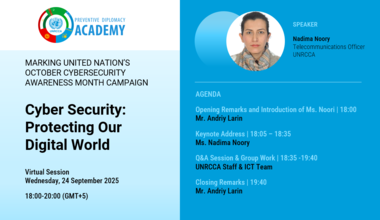UNRCCA PREVENTIVE DIPLOMACY ACADEMY ADDRESSES TRAFFICKING IN PERSONS IN CENTRAL ASIA
ASHGABAT, Turkmenistan
On 9 September 2025, the UNRCCA Preventive Diplomacy Academy (PDA) organized a specialized online session focused on combating trafficking in persons. This initiative underscored the young people’s emphasis on addressing urgent regional security challenges and was held in commemoration of the World Day against Trafficking in Persons, observed annually on 30 July.
Participants examined the dynamics of human trafficking and reviewed relevant international legal frameworks, aimed at countering this transnational crime. They also engaged with an overview of the United Nations Convention against Transnational Organized Crime (UNTOC) and its three supplementary protocols:
- The Protocol to Prevent, Suppress and Punish Trafficking in Persons, Especially Women and Children, which prioritizes protection for vulnerable populations;
- The Protocol against the Smuggling of Migrants by Land, Sea and Air, which addresses illicit migration networks;
- The Protocol against the Illicit Manufacturing of and Trafficking in Firearms, Their Parts and Components and Ammunition, which deals with arms trafficking often linked to organized crime.
This comprehensive programme enhanced participants’ understanding of the multifaceted nature of trafficking in persons, distinguishing it from related phenomena such as child trafficking and migrant smuggling. The session further analyzed regional trafficking trends in Central Asia from a preventive diplomacy perspective and explored emerging threats, including trafficking associated with scam operations, highlighting innovative responses.
Led by Dr. Reda Sirgediene, UNODC Regional Adviser for Central Asia on Trafficking in Persons and Smuggling of Migrants, based in Tashkent, Uzbekistan, the session combined theoretical frameworks with practical expertise.
This activity exemplifies the PDA’s commitment to strengthening the capacities of Central Asia’s emerging young leaders. By providing critical knowledge and fostering collaborative approaches to transnational challenges, the Academy contributes to reinforcing the nexus between human security and regional stability.
 UN
UN





